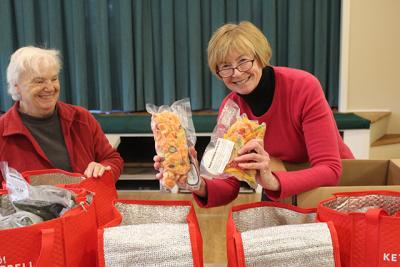A Winter Bounty for Springs Food Pantry

A pilot program providing low-income families with organic frozen produce through the winter months has made its first delivery to the Springs Food Pantry.
Throughout last year’s peak harvest season, the new program, called Farm to Community, packaged and froze vegetables and fruit, allowing donations to be set aside for the colder months, when fresh produce is less readily available.
The effort is supported by the Balm Foundation and being run by the Amagansett Food Institute, Share the Harvest Farm, Stony Brook Medicine, and Cornell Cooperative Extension of Suffolk County.
Share the Harvest Farm, a nonprofit based on Long Lane in East Hampton that is dedicated to fighting food insecurity, provided more than 3,000 pounds of surplus produce. The bounty of vegetables from Share the Harvest Farm was quickly vacuum sealed and frozen by the Amagansett Food Institute at its South Fork Kitchens facility on Stony Brook University’s Southampton campus.
The first delivery to the Springs Food Pantry included frozen kale, carrots, peppers, peaches, nectarines, and pears. Last June, Farm to Table coordinated the donation of grass-fed beef, from cattle owned by Acabonac Farms that graze on Shelter Island, to a number of East End pantries.
The demand on East End food pantries dramatically rises in winter, as heating bills spike and seasonal jobs are lost. The Farm to Community pilot program is meant to supplement the canned and dry goods usually seen on pantry shelves during the long weeks when many residents find themselves hard pressed to put nutritious meals on the table.
Cornell Cooperative Extension’s mission is to provide families with information on nutrition, agriculture, the environment, and wellness; representatives were on hand to witness the first delivery to Springs. Marta Blanco, a bilingual nutritionist and representative from C.C.E., offered visitors a chicken-and-vegetable soup that had been prepared using the donated produce. A recipe sheet with nutritional information and cost per serving was offered alongside the soup.
If all continues to go as planned, the Farm to Community program will benefit the entire town not just by offering families good food, but by eliminating agricultural waste and further integrating organic farming into the community. “Our agricultural soils are so rich,”said Kate Fullam, the executive director of the Amagansett Food Institute. “If we maximize the harvest season . . . we will have a better food economy and environment.”
Organic farms like Share the Harvest, operating without chemical pesticides, are said to have a positive effect on biodiversity, as well as to be better for the water table: They don’t use synthetic fertilizers, which can have harmful runoff.
Jess Tonn, a coordinator at Share the Harvest, responded yes when asked if the program had already helped reduce the farm’s food waste. The produce that was frozen and donated in 2018 would have been composted, otherwise, and never consumed.
There are big plans for the year ahead.
According to a webpage selling tickets to an “Eating Well All Winter” cooking workshop and fund-raiser to be held at the South Fork Kitchens on Saturday at 11:30 a.m., the program’s goals for 2019 are “to expand refrigeration capacity, add distribution from South Fork Kitchens in Southampton, and partner up with more farms and local institutions.”
